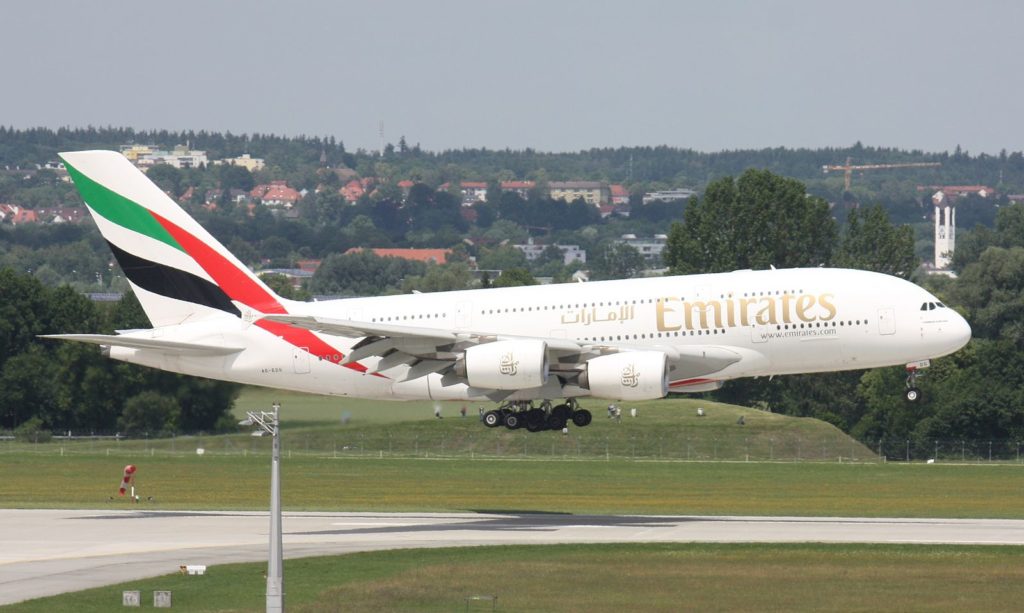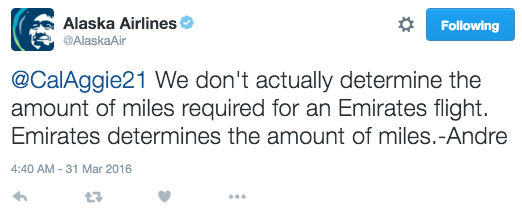
Alaska Airlines has taken a ton of heat today for its decision to raise prices for business and first class tickets on Emirates by as much as 100%. Now it is defending itself on its blog, claiming that its old award chart was unsustainable and blaming “travel-hacking” for the change. It also promsies to give notice next time “when at all possible”.
First off, you should read the blog post.
Alaska Airlines Defends Lack of Notice
Alaska reasons that while it normally will provide notice for devaluations, it could not in this case.
Given the dynamics of this particular award, we were unable to announce changes in advance.
Scott from Travel Codex reasons that one reason may be that hold times would be absolutely astronomical in the days leading up to the devaluation.
I do not doubt that — Alaska is a small airline and the partner award desk team is very small…so small they can all sit around a table together.
Nevertheless, it seems a pretty weak reason to devalue a program in such a draconian manner with no notice.
Alaska Airlines Promises to Give Notice…When it Can
Alaska also said that today’s devaluation should be seen as an anomaly.
This approach doesn’t represent a new normal. Our policy is to communicate significant program changes with at least 30 days’ notice when at all possible.
If that is the “policy” then why wasn’t it followed today? What “dynamics” were at play?
It explicitly promises to give notice for all future changes to the Emirates award chart:
Future changes, if any, to these award levels will be given with advance notice.
But how much notice? And why not this time? And does the “when at all possible” caveat apply to this too?
Alaska Airlines Blames “Travel Hackers” for Change
Alaska argues that Emirates pricing was “below market level” (not true when you compare Alaska to JAL, which also offers Emirates redemptions):
Alaska’s premium Emirates awards have long been known as an exceptionally good deal. With the rise of “travel-hacking,” intended to exploit Mileage Plan’s award routing rules, coupled with below-market award levels, our previous award levels were unsustainable. The new award levels enable Alaska to continue to offer Emirates Business Class and First Class as a redemption option.
Blogs that talk up Alaska Airlines First Class Emirates redemptions are a two-edged sword. They are critical for helping people understand where their miles can take them while at the same time risk spoiling a good deal through overexposure.
I am of the opinion that bloggers contribute far more good than bad and those fuming at bloggers are just being selfish. Nevertheless, I think we can all agree that stories like this in the Daily Mail did the most damage.
Did Emirates Force Alaska to Raise Prices?
Earlier today we saw the following tweet from Alaska:

The outstanding question remains whether Emirates does have some sway over pricing or whether it simply raised reimbursements levels, in a sense making each redemption on Emirates much more expensive. Or perhaps they did nothing and this is just subterfuge by Alaska.
Take it from this contract lawyer — those changes don’t happen overnight, so if this was only a matter of Alaska having to pay Emirates more, it would have been signed and negotiated weeks to months in advance.
My theory is that Emirates probably did put some pressure on them, but ultimately Emirates cannot force Alaska to raise its mileage prices … it can only block space or raise the price it charges Alaska for that space.
I wonder if this devaluation will fix the problem agents have in seeing one less seat than is available to Emirates’ own members?
Alaska Airlines Will Refund All Mileage Purchases Made On or After 01 March 2016
In an unsurprising move, Alaska has offered to refund any mileage purchase made in anticipation of an Emirates redemption — which means any mileage purchase whatsoever made on or after March 01, 2016.
That’s the right thing to do and today’s devaluation may well have prompted detrimental reliance lawsuits had such refunds not been offered.
CONCLUSION
Alaska has lost all credibility and trust in my mind and will have to do far more than refund mileage purchases to regain it. Truth be told, the Emirates redemptions were “too good to be true” and thus a change (though not so dramatic) was expected. Even this drastic change would have been grudgingly accepted with some notice. Alaska broke the cardinal rule of trust and its effort to say, “we’re still good and won’t do it next time” rings hollow, especially when Alaska only promises to give advance notice “when at all possible”.




Well said.
Typical blogger nonsense. Trying to shift the blame to someone else. How about accepting responsibility that all you guys collectively as a whole were responsible. The daily mail article has very little effect at best, filled with newbies and non-churners. Probably Alaska actually prefers those types of customers then loss leader customers such as ourselves.
Matter of fact, the constant pimping of EK first class by the boarding area & upgrd “conglomerate” is the real reason to blame.
I might be more cynical than you, but I’m surprised that you feel that Alaska had significantly more credibility and trust to begin with. Yes, they seemed to deserve more credibility than, say, DL AA and UA, but at the end of the day, an airline in a cut-throat industry like AS is going to look after their bottom line. And to me that is, very simply, what they are doing here. From a business standpoint, they obviously feel that the negative aspects of this move for them (bad publicity, some upset customers, etc.) are outweighed by the positives. To me the only surprising thing, possibly, is that they didn’t announce this change on a Friday afternoon.
Using this as a cautionary tale, we would all do well to consider even more drastic changes to the way in which miles and points can be used. What would you do if all of a sudden, tomorrow morning, your UA AA or DL miles were revalued at, say, exactly $0.01 toward the retail price of a plane ticket and award charts disappeared? To me, the risk of something like this happening is very real. While something like this is likely not going to happen tomorrow or the next day, in 5 years I would not be surprised that at least one of the three aforementioned airlines has this scheme, and we would be fools not to consider a world in which such rules are de rigeur.